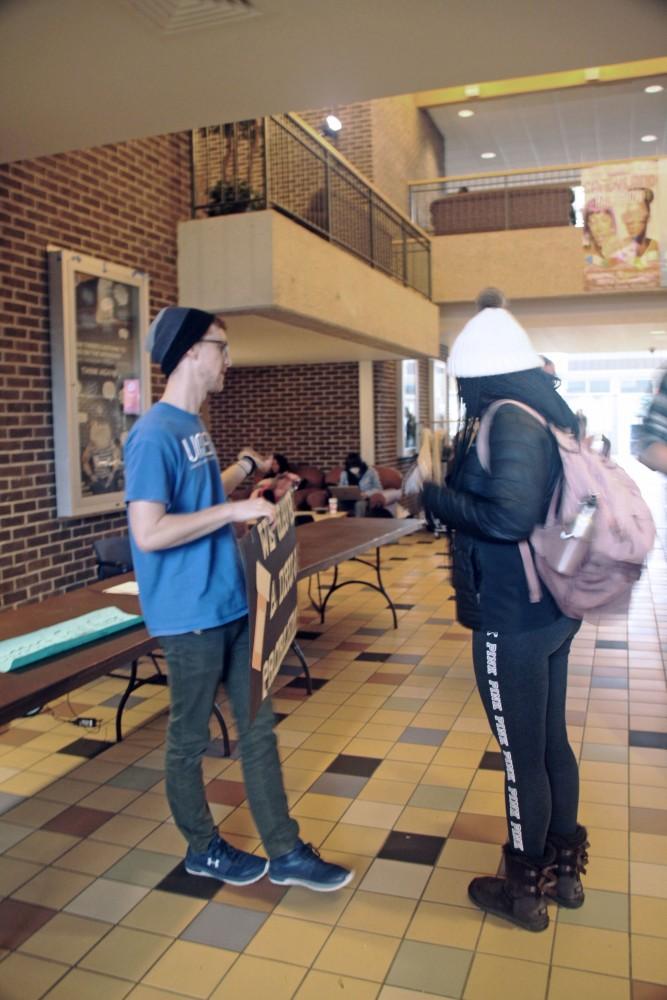UAEM educates, promotes accessible medicine in week-long campaign

Access To Medicines spreading awareness about global heath disparities at Kirkhof Center on November 6th, 2018. GVL / Emily Modloff
Nov 12, 2018
Grand Valley State University’s Universities Allied for Essential Medicines (UAEM) chapter hosted an Access to Medicines week from Nov. 5 to 11 to promote easier access to medications.
UAEM’s main goal for the week was to receive signatures for the Global Access Licensing Framework, a document the entire corporation collaborates on to help start conversation about creating transparencies in access to medicine in the university setting. UAEM students hope to receive 160 signatures by the end of November in order to present the petition to the Student Senate and university.
“The goal of Access to Medicines Week isn’t necessarily to give all the students at GV a fully deep, comprehensive understanding of all these issues,” UAEM at Grand Valley State Vice President Collin Trainor said. “We just want to bring these issues to light and help them have a voice and a say in what their opinion should be on how the issue should be resolved.”
While GVSU is considered a research institution where professors have the freedom to conduct research, there is not a policy in place that ensures professors publish these findings. UAEM at Grand Valley State President Haley Sullivan explained that if a professor is developing a pharmaceutical, there is no policy which says they need to publish these results or be transparent. Because there is no transparency, there is a high probability another professor could be researching the same thing and these projects often never reach completion.
“If they do progress and develop into a pharmaceutical, they can patent that drug, and that essentially means no other generic developing company can touch it,” Sullivan said. “There’s nothing in the patent that says people abroad in developing countries can access that information either, which means nobody can produce it except for someone he allows to under the patent, which means the drug will be very, very, very expensive.”
This makes a variety of medications inaccessible to patients in all countries. Trainor said that one of the week’s activities included UAEM students tabling in Kirkhof and asking students to lay in a coffin when they couldn’t pay off their fake health payments. UAEM students took this opportunity to inform students about insulin, diabetes and multi-drug resistant tuberculosis (MDRTB).
“MDRTB is the leading cause of death from an infectious disease around the world,” Trainor said. “We’ve known a cure for approximately 70 years, but still every year over a million die, and the reason for that is because they don’t have access to the right antibiotics. TB is drug resistant to a certain kind of antibiotic, but there’s other kinds that have recently been researched and developed that if people had access to those medications, that number would be a lot lower.”
Activities also included mindfulness yoga and a showing of the documentary “Bending the Arc.”
“(‘Bending the Arc’ director Paul Farmer) got a really unique story when it comes to global health because he was able to recruit a lot of donors for his projects because he’s very smart and people believed in his cause,” Sullivan said. “He brought healthcare to so many people, it’s incredible. I think a documentary like that can be very inspiring and can educate you at the same time. It’s really a global health crisis that we’re having.”
GVSU’s UAEM chapter is made up of a variety of majors. They include but are not limited to biomedical sciences, nursing and criminal justice.
“A lot of the patent laws have to do with pre-law students and even business students because they are the ones who are going to start working for the pharmaceutical companies because it’s written like a business,” Sullivan said. “We’re actually seeking members from diverse majors.”
UAEM will also have a conference in the spring about access to medicines for students who are interested in understanding how the UAEM movement works.

























